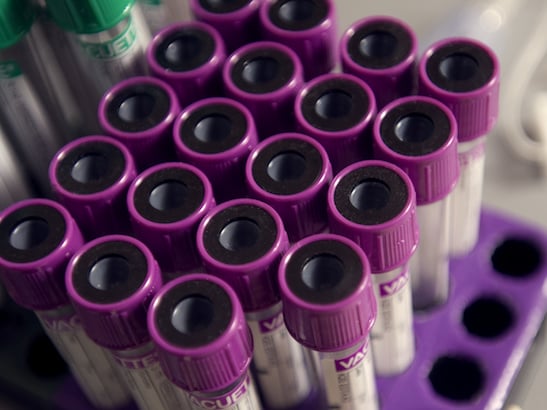Video: Prostate cancer patient, Rob Lester, visits an ICR lab to find our more about liquid biopsies.
Imagine if a blood test could show whether a tumour is responding to treatment, without the need for invasive and sometimes painful biopsies. Imagine if it could give doctors an early warning that a drug has stopped working, and offer valuable information about the next one to try. Thanks to our research, these tests are now becoming a reality.
No two cancers are alike. Their genetic make-up – their DNA code – varies from person to person and can change over time. But a cancer’s specific genetics can have a big impact on how it responds to treatment.
Our researchers are developing new blood tests to stay one step ahead of this process, allowing us to predict which available treatments will give the most benefit to patients.
Quicker, simpler, less invasive
Known as liquid biopsies, the tests are already routinely used in clinical trials, including those we run with our partner hospital, The Royal Marsden NHS Foundation Trust.
Because they don’t require a tissue sample, liquid biopsies are quicker, simpler and far less invasive than a traditional biopsy. Instead, the tests analyse cancer DNA circulating in the blood to determine whether a drug is working.
This also means they can pick up DNA from multiple tumours throughout the body, giving a more comprehensive picture than has previously been possible.
Drug resistance identified earlier
Dr Gerhardt Attard, Clinician Scientist at The Institute of Cancer Research, London, and Consultant at The Royal Marsden, has developed a new liquid biopsy to identify patients with advanced prostate cancer who are unlikely to respond to abiraterone – the standard treatment for the disease.
Discovered at the ICR, abiraterone has given thousands of patients valuable extra months of life, while causing fewer side-effects than chemotherapy. Unfortunately, some patients don’t respond to it, and need to be given a different treatment.
Dr Attard’s research using the liquid biopsy showed that patients with certain changes to their androgen receptor gene, such as mutations within the gene and extra copies of the gene itself, were much less likely to respond to abiraterone.
The test was also able to spot drug resistance several months before patients showed signs that their disease was progressing once again.
“Our liquid biopsy isolates and analyses tumour DNA from the blood to identify the key genetic changes that drive abiraterone resistance,” explains Dr Attard. “In the future, the test could tell us in real time which patients have stopped benefiting from the drug, and allow us to offer other treatments much more quickly.
“We are now beginning a new clinical trial, involving up to 600 men, in which we aim to show that patients who test positive for these genetic mutations get significantly greater benefit from chemotherapy compared to abiraterone. If the clinical trial has positive results, we could see the liquid biopsy adopted into more routine clinical practice in prostate cancer.”
Search is our twice-yearly newsletter to supporters. Read our latest news, recent research achievements and interviews with our world-leading scientists and clinicians.
More effective breast cancer treatment
Other researchers at the ICR and The Royal Marsden are also developing liquid biopsies to treat other cancers.
Professor Nicholas Turner, Team Leader in Molecular Oncology at the ICR and Consultant at The Royal Marsden, has developed a liquid biopsy that can detect when the most common form of breast cancer has become resistant to treatment.
The test spots mutations in the oestrogen receptor gene, which indicate that the cancer will no longer respond to oestrogen-blocking drugs such as exemestane.
Women who were picked up by the liquid biopsy as having this mutation fared better on an alternative drug called fulvestrant, which instead stops oestrogen reaching the tumour.
Like Dr Attard, Professor Turner is now running a clinical trial to confirm his results. The trial will use liquid biopsies to identify these genetic mutations in tumour cells, and then match the patients to the most appropriate treatment.
Should bigger trials of these new tests be successful, liquid biopsies could become routinely used in NHS hospitals, since the less invasive tests are also more cost effective than their traditional counterparts.
As a result, this exciting research could make liquid biopsies accessible to a large number of patients – making sure that more people with cancer get the right treatment at the right time.
